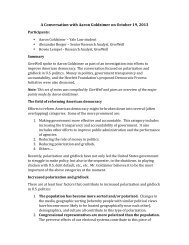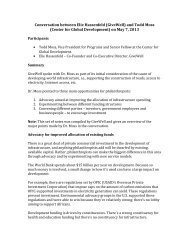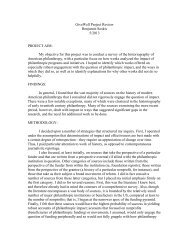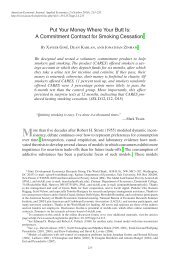Getting In Staying On Moving Up - GiveWell
Getting In Staying On Moving Up - GiveWell
Getting In Staying On Moving Up - GiveWell
Create successful ePaper yourself
Turn your PDF publications into a flip-book with our unique Google optimized e-Paper software.
GETTING IN, <strong>Staying</strong> on, <strong>Moving</strong> <strong>Up</strong> 19<br />
on their own, without reliance on job developers.<br />
While most <strong>Moving</strong> <strong>Up</strong> clients need<br />
help finding jobs, the program is nonetheless<br />
designed to teach them how to look for<br />
work on their own. So the “self-search” proceeds<br />
at the same time that the job developer<br />
is looking for placement opportunities.<br />
Career advisors show students how to<br />
scan help-wanted ads, write cover letters<br />
and resumes, make telephone inquiries,<br />
and generally look for work independently.<br />
And in fact, this often yields results: almost<br />
20 percent of <strong>Moving</strong> <strong>Up</strong> placements every<br />
year are the results of clients’ own efforts.<br />
Beyond 9 to 5<br />
Career advisors take turns hosting afterhours<br />
labs twice a week, where clients can<br />
spend a few hours working on their typing<br />
skills, polishing resumes or getting help<br />
with anything else that may arise. The afterhours<br />
lab is often just a place to “hang out”<br />
that is away from a bad home environment<br />
or neighborhood. Career advisors also run<br />
more structured workshops on such topics<br />
as conduct in the workplace, job search<br />
techniques, career choices and dealing with<br />
job loss. Career advisors teach clients how<br />
to deal with office gossip and politics and<br />
how to interact with their supervisors.<br />
Sometimes these groups are more formal,<br />
sometimes less. Clients and their career<br />
advisor may, for instance, simply watch a<br />
movie together and then discuss its relevance<br />
to their own situations. Career advisors<br />
also make use of cultural outings and<br />
the discretionary funds that go with them<br />
to build a peer support network and to<br />
cement their relationships with the clients.<br />
Almost all staff members escort clients to<br />
plays, movies and music or dance events,<br />
usually with donated tickets and money<br />
from a discretionary fund to pay for modest<br />
meals (employees are allowed to spend<br />
up to $80 per outing, depending on how<br />
many clients go).<br />
Career advisors are also equipped with<br />
beepers and can be paged at any time for<br />
emergencies. Although VFI provides up to<br />
three hours of compensatory time off for<br />
such after-hours work, by one career advisor’s<br />
account, talking with clients on the<br />
phone can consume up to six hours of personal<br />
time a week. Although the off-hours<br />
contact is invaluable—especially for students<br />
whose personal lives may be chaotic<br />
and prone to crises—the drain on career<br />
advisors is a constant concern for VFI management.<br />
“I sometimes have to talk to<br />
them,” said a supervisor, “about making<br />
sure they don’t lose that line between their<br />
work and their life.”<br />
<strong>Staying</strong> in Touch After Placement<br />
After their first day on a new job, clients get<br />
a call from their career advisor to talk over<br />
everything that happened that day. <strong>In</strong> a<br />
free-ranging conversation, the career advisor’s<br />
questions are direct and designed to<br />
ferret out any signs of trouble: “What time<br />
did you arrive? When did you take lunch?<br />
What did you wear? Were you busy all the<br />
time? When things got slow, did you ask for

















